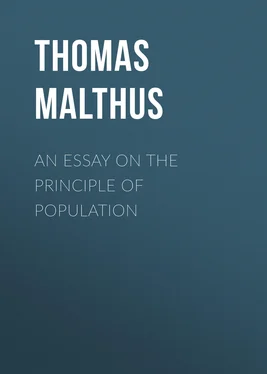Thomas Malthus - An Essay on the Principle of Population
Здесь есть возможность читать онлайн «Thomas Malthus - An Essay on the Principle of Population» — ознакомительный отрывок электронной книги совершенно бесплатно, а после прочтения отрывка купить полную версию. В некоторых случаях можно слушать аудио, скачать через торрент в формате fb2 и присутствует краткое содержание. Жанр: foreign_edu, sociology_book, на английском языке. Описание произведения, (предисловие) а так же отзывы посетителей доступны на портале библиотеки ЛибКат.
- Название:An Essay on the Principle of Population
- Автор:
- Жанр:
- Год:неизвестен
- ISBN:нет данных
- Рейтинг книги:3 / 5. Голосов: 1
-
Избранное:Добавить в избранное
- Отзывы:
-
Ваша оценка:
- 60
- 1
- 2
- 3
- 4
- 5
An Essay on the Principle of Population: краткое содержание, описание и аннотация
Предлагаем к чтению аннотацию, описание, краткое содержание или предисловие (зависит от того, что написал сам автор книги «An Essay on the Principle of Population»). Если вы не нашли необходимую информацию о книге — напишите в комментариях, мы постараемся отыскать её.
An Essay on the Principle of Population — читать онлайн ознакомительный отрывок
Ниже представлен текст книги, разбитый по страницам. Система сохранения места последней прочитанной страницы, позволяет с удобством читать онлайн бесплатно книгу «An Essay on the Principle of Population», без необходимости каждый раз заново искать на чём Вы остановились. Поставьте закладку, и сможете в любой момент перейти на страницу, на которой закончили чтение.
Интервал:
Закладка:
In examining the principal states of modern Europe, we shall find that though they have increased very considerably in population since they were nations of shepherds, yet that at present their progress is but slow, and instead of doubling their numbers every twenty-five years they require three or four hundred years, or more, for that purpose. Some, indeed, may be absolutely stationary, and others even retrograde. The cause of this slow progress in population cannot be traced to a decay of the passion between the sexes. We have sufficient reason to think that this natural propensity exists still in undiminished vigour. Why then do not its effects appear in a rapid increase of the human species? An intimate view of the state of society in any one country in Europe, which may serve equally for all, will enable us to answer this question, and to say that a foresight of the difficulties attending the rearing of a family acts as a preventive check, and the actual distresses of some of the lower classes, by which they are disabled from giving the proper food and attention to their children, act as a positive check to the natural increase of population.
England, as one of the most flourishing states of Europe, may be fairly taken for an example, and the observations made will apply with but little variation to any other country where the population increases slowly.
The preventive check appears to operate in some degree through all the ranks of society in England. There are some men, even in the highest rank, who are prevented from marrying by the idea of the expenses that they must retrench, and the fancied pleasures that they must deprive themselves of, on the supposition of having a family. These considerations are certainly trivial, but a preventive foresight of this kind has objects of much greater weight for its contemplation as we go lower.
A man of liberal education, but with an income only just sufficient to enable him to associate in the rank of gentlemen, must feel absolutely certain that if he marries and has a family he shall be obliged, if he mixes at all in society, to rank himself with moderate farmers and the lower class of tradesmen. The woman that a man of education would naturally make the object of his choice would be one brought up in the same tastes and sentiments with himself and used to the familiar intercourse of a society totally different from that to which she must be reduced by marriage. Can a man consent to place the object of his affection in a situation so discordant, probably, to her tastes and inclinations? Two or three steps of descent in society, particularly at this round of the ladder, where education ends and ignorance begins, will not be considered by the generality of people as a fancied and chimerical, but a real and essential evil. If society be held desirable, it surely must be free, equal, and reciprocal society, where benefits are conferred as well as received, and not such as the dependent finds with his patron or the poor with the rich.
These considerations undoubtedly prevent a great number in this rank of life from following the bent of their inclinations in an early attachment. Others, guided either by a stronger passion, or a weaker judgement, break through these restraints, and it would be hard indeed, if the gratification of so delightful a passion as virtuous love, did not, sometimes, more than counterbalance all its attendant evils. But I fear it must be owned that the more general consequences of such marriages are rather calculated to justify than to repress the forebodings of the prudent.
The sons of tradesmen and farmers are exhorted not to marry, and generally find it necessary to pursue this advice till they are settled in some business or farm that may enable them to support a family. These events may not, perhaps, occur till they are far advanced in life. The scarcity of farms is a very general complaint in England. And the competition in every kind of business is so great that it is not possible that all should be successful.
The labourer who earns eighteen pence a day and lives with some degree of comfort as a single man, will hesitate a little before he divides that pittance among four or five, which seems to be but just sufficient for one. Harder fare and harder labour he would submit to for the sake of living with the woman that he loves, but he must feel conscious, if he thinks at all, that should he have a large family, and any ill luck whatever, no degree of frugality, no possible exertion of his manual strength could preserve him from the heart-rending sensation of seeing his children starve, or of forfeiting his independence, and being obliged to the parish for their support. The love of independence is a sentiment that surely none would wish to be erased from the breast of man, though the parish law of England, it must be confessed, is a system of all others the most calculated gradually to weaken this sentiment, and in the end may eradicate it completely.
The servants who live in gentlemen's families have restraints that are yet stronger to break through in venturing upon marriage. They possess the necessaries, and even the comforts of life, almost in as great plenty as their masters. Their work is easy and their food luxurious compared with the class of labourers. And their sense of dependence is weakened by the conscious power of changing their masters, if they feel themselves offended. Thus comfortably situated at present, what are their prospects in marrying? Without knowledge or capital, either for business, or farming, and unused and therefore unable, to earn a subsistence by daily labour, their only refuge seems to be a miserable ale-house, which certainly offers no very enchanting prospect of a happy evening to their lives. By much the greater part, therefore, deterred by this uninviting view of their future situation, content themselves with remaining single where they are.
If this sketch of the state of society in England be near the truth, and I do not conceive that it is exaggerated, it will be allowed that the preventive check to population in this country operates, though with varied force, through all the classes of the community. The same observation will hold true with regard to all old states. The effects, indeed, of these restraints upon marriage are but too conspicuous in the consequent vices that are produced in almost every part of the world, vices that are continually involving both sexes in inextricable unhappiness.
CHAPTER 5
The second, or positive check to population examined, in England—The true cause why the immense sum collected in England for the poor does not better their condition—The powerful tendency of the poor laws to defeat their own purpose—Palliative of the distresses of the poor proposed—The absolute impossibility, from the fixed laws of our nature, that the pressure of want can ever be completely removed from the lower classes of society—All the checks to population may be resolved into misery or vice.
The positive check to population, by which I mean the check that represses an increase which is already begun, is confined chiefly, though not perhaps solely, to the lowest orders of society.
This check is not so obvious to common view as the other I have mentioned, and, to prove distinctly the force and extent of its operation would require, perhaps, more data than we are in possession of. But I believe it has been very generally remarked by those who have attended to bills of mortality that of the number of children who die annually, much too great a proportion belongs to those who may be supposed unable to give their offspring proper food and attention, exposed as they are occasionally to severe distress and confined, perhaps, to unwholesome habitations and hard labour. This mortality among the children of the poor has been constantly taken notice of in all towns. It certainly does not prevail in an equal degree in the country, but the subject has not hitherto received sufficient attention to enable anyone to say that there are not more deaths in proportion among the children of the poor, even in the country, than among those of the middling and higher classes. Indeed, it seems difficult to suppose that a labourer's wife who has six children, and who is sometimes in absolute want of bread, should be able always to give them the food and attention necessary to support life. The sons and daughters of peasants will not be found such rosy cherubs in real life as they are described to be in romances. It cannot fail to be remarked by those who live much in the country that the sons of labourers are very apt to be stunted in their growth, and are a long while arriving at maturity. Boys that you would guess to be fourteen or fifteen are, upon inquiry, frequently found to be eighteen or nineteen. And the lads who drive plough, which must certainly be a healthy exercise, are very rarely seen with any appearance of calves to their legs: a circumstance which can only be attributed to a want either of proper or of sufficient nourishment.
Читать дальшеИнтервал:
Закладка:
Похожие книги на «An Essay on the Principle of Population»
Представляем Вашему вниманию похожие книги на «An Essay on the Principle of Population» списком для выбора. Мы отобрали схожую по названию и смыслу литературу в надежде предоставить читателям больше вариантов отыскать новые, интересные, ещё непрочитанные произведения.
Обсуждение, отзывы о книге «An Essay on the Principle of Population» и просто собственные мнения читателей. Оставьте ваши комментарии, напишите, что Вы думаете о произведении, его смысле или главных героях. Укажите что конкретно понравилось, а что нет, и почему Вы так считаете.












